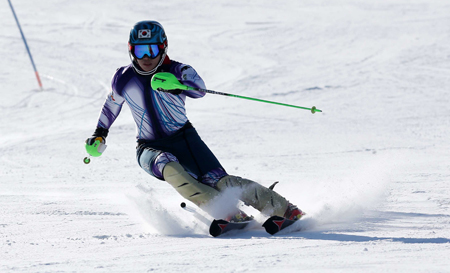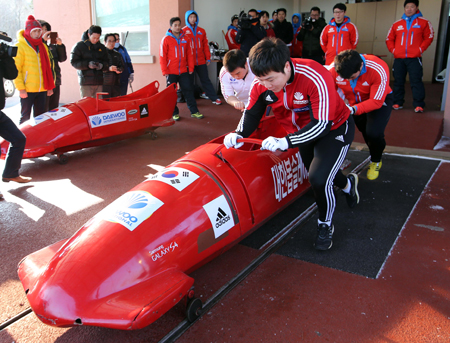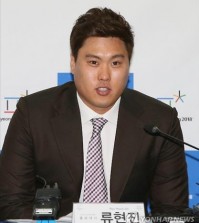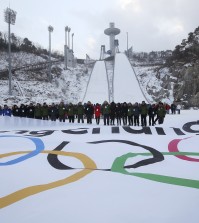- California Assembly OKs highest minimum wage in nation
- S. Korea unveils first graphic cigarette warnings
- US joins with South Korea, Japan in bid to deter North Korea
- LPGA golfer Chun In-gee finally back in action
- S. Korea won’t be top seed in final World Cup qualification round
- US men’s soccer misses 2nd straight Olympics
- US back on track in qualifying with 4-0 win over Guatemala
- High-intensity workout injuries spawn cottage industry
- CDC expands range of Zika mosquitoes into parts of Northeast
- Who knew? ‘The Walking Dead’ is helping families connect
Alpine skier eyes rebound in Sochi
Alpine skier returns from injury, hopes to make top 20 at Sochi

After being sidelined from the 2006 and 2010 Games, Jung Dong-hyun is eyeing his first Olympic appearance in Sochi. (Yonhap)
By Kwon Ji-youn
There is never a good time for misfortune, but Jung Dong-hyun argues that his experience has been the worst. Whenever the alpine skier has attempted to appear in the Olympics, a variety of setbacks kept him at home.
The 26-year-old is now hoping that his luck will even out. After being sidelined from the 2006 Winter Olympics in Torino and the 2010 Vancouver Games, Jeong will finally get the opportunity to display his skills on the Olympic stage in Sochi.
His goal is to set a new Korean record and finish in the top 20 in the men’s alpine ski competition. He expects to be in contention for an Olympic medal by 2018, when the Games come to the sleepy Korean ski resort of PyeongChang.
Jung discovered his passion for skiing very early. At the age of 3, Jung learned to ski at a slope near his home. He loved that he could exercise while enjoying the crisp air and beautiful hills. He also loved the thrill of making sharp turns while maintaining speed.
He began competing in domestic events as a first-grader, and only three years later he snagged three gold medals at the Korean national sports festival in alpine skiing, a discipline that requires skiers to slide down a course swerving in and out of positioned gates. Slalom skiing races require shorter and tighter turns while giant-slalom races require widely spaced turns.
From 2004, Jung began reaching podiums at international events. In 2005, he topped an event in Otaru, Japan, which won him a spot in the alpine skiing event for the 2006 Games.
However, the Korea Ski Association made a controversial decision to exclude him from the delegation to Torino after Jeong refused to join the national team’s training camp because of a preference to train individually and avoid missing school.
After serving his suspension, Jung returned to the national team in 2009 and finished fifth in the giant slalom and ninth in the super giant slalom at the Winter Universiade in Harbin, China.
He seemed on course for making his first Olympic appearance in Vancouver, but then an injury held him back. Just a week before the Games, Jeong fell the wrong way and ruptured a muscle.
Jung rehabbed and by 2011, he was back on top of the podium at the East Asian Games, becoming the second Korean gold-medalist in alpine skiing at an international event. In 2013, he won three gold medals at the national sports festival.
“My muscle has healed and I’m in good condition,” he told The Korea Times. “I train on snow for about four hours a day, and in the gym for about two hours.”
Jung knows he’s not favored to win any medals, but he does hope to improve on Korea’s Olympic best in alpine skiing, a 21st-place finish in 1998.
“I think I’m good at working through the race, but to utilize techniques more efficiently I’m going to need to work on stamina,” he said. “That’s what I’ve been concentrating on.”
The challenge, Jung says, will be to constantly be aware of the condition and shape of the slope and adapt to any changes.
“We rarely compete on the same slope over and over,” he said. “So I will need to check to make sure the temperature hasn’t brought about any major changes that will cause unforeseen difficulties.”
According to Jung, his uncle, a ski coach based in the United States, played a significant role in building his career.
“He would monitor my training sessions and advise me on how to maximize speed and maintain balance,” he said. “It helped me a lot.”
Jung hopes to extend his career as long as he can, and when he does retire, he hopes to remain active in the field, helping prospects learn from his experiences in international events. But his shorter-term goals are setting a Korean record at the Sochi Games and, ultimately, winning a medal at the PyeongChang Games.
“Because we’ll be competing on home ground, I’m determined to bring home a medal then,” he said. “But to do that, we athletes are going to need a lot of support.”
















